Paul Korman, The Phantom Fellows – Gags, ghosts and indie game development
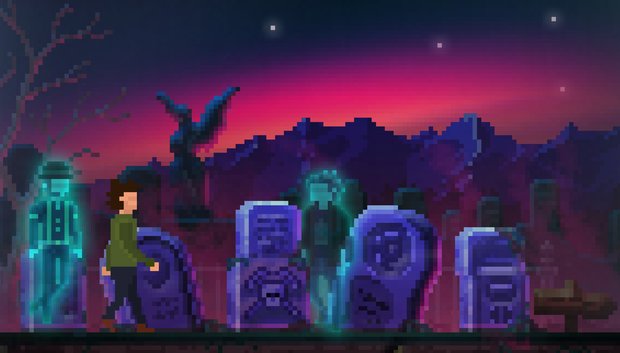
- 0 Comments
Paul Korman sees dead people. And laughs. Or at least, he’s intent on making us laugh at them with his solo debut release, The Phantom Fellows. In between bi-weekly shows as part of the Classic Gamers Guild Podcast duo with co-host Anna Vigue, Paul has been busily toiling away on this project for many years now, and at long last the big day is nearly here. If you haven’t already, you can (and should) check out the playable demo of this hilarious dual-character supernatural adventure that brings classic adventuring to life – or something resembling life, anyway – with a lovely retro-modern pixel art aesthetic, multiple puzzle solutions and a host of user-friendly features. It’s rare for games to make me truly laugh out loud, but The Phantom Fellows is one of those exceptions, so I was eager to catch up with Paul for a playful chat to learn more about the man behind the madness and a game you’re not going to want to miss, filled with things that make yuks in the night.
Hi, Paul. Great to talk to you again. I hope you’ve fully recovered from the Adventure Game Fan Fair, because you’ve got a game to launch soon! Hard to imagine anyone doesn’t know by now, but please tell us a bit about The Phantom Fellows.
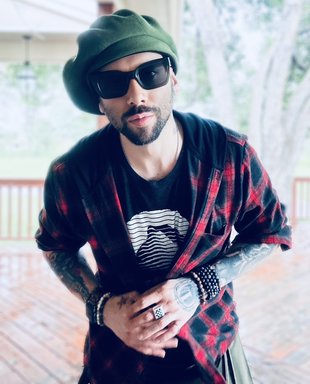
I was promised you wouldn’t bring my game up during this interview, and frankly I’m not prepared to comment on it... Sorry, sorry, I just feel like being as difficult as I possibly can for some reason. You know why, because you’ve had it too easy, for too long, Jack. Phoning in this interview from your Scrooge McDuck-like pile of coins. Ridiculous. Okay, is this– is this too unhinged? I’ll settle down and answer questions now, promise.
The Phantom Fellows is a comedy about two best friends who start a paranormal investigation business together, since one of them is already dead. I began making this game nearly four years ago. At the time my son was five years old-ish and as a solo parent I felt this urge to create something that could be like a legacy for him, and I wanted him to grow up seeing his dad doing something he loved, and creating and aiming high– you know, cos good influence and whatever. So, I taught myself how to code and how to do pixel art, and luckily I was bringing with me some experience with music and writing, which combined with my arguably unhealthy level of obsession with adventure games, was enough to make this game.
That was actually far more hinged than I expected, Paul, so we’re off to a good start. You're right about the coins, but loose change doesn't stretch nearly as far these days. Now, ghosts tend to creep people out rather than make them laugh, but you’ve made a very funny game out of the premise of dead people haunting the living. What made you decide to take that route with your story?
Unclear. I trust past me had a good reason.
Right, I promised I’d cooperate, I’m sorry. Okay, so when I settled on the premise for this game, I didn’t come from an angle of “this is the story I want to tell!” Rather, I designed it as a massive fan of adventure games, asking myself “what do I want to play?” And making this game was a lot of checking those things off my curated list of must-haves for a great point-and-click adventure. More to your question, it’s two-part: I really enjoy writing situational and observational humor, and I just really value humor in general, so it was always going to be primarily a comedy. And the reason I went with a ghost is because I love when adventure games let you switch between characters and when they have different but complementary skills. So, in this case one of them is super good at breathing, while the other not so much. Anyway, once I had settled that the protagonists would be a duo and one would be a ghost, I then began to ask myself what kind of story this would be, besides arguably funny.
I’d argue that it’s inarguably funny. Yet there’s much more to your game than just comedy. You’ve taken care to make your characters real people rather than just caricatures.
Thank you for that! I really wanted my game to read and sound like how we all actually talk, and more so, I wanted the characters to feel real if not familiar or even relatable. So while the priority is comedy and making the player laugh, I also wanted to make sure there was sustenance like character and story arcs, and dare I say some emotional depth in addition to humor.
The other side of this is I envisioned my game like, quietly, subtly, teaching my son some solid life lessons. I wanted to give him good advice through the game’s story and characters, and it naturally came together where Englebert (the floater) is much older than Oliver (the breather) and he takes on the role of a sort of mentor to Oliver. So when he’s not being cynical and giving Oliver a hard time, he’s subtly trying to nudge Oliver towards realizing his own potential, whether that’s through advice and shared wisdom or through Englebert’s occasional philosophical musings. My hope is that the baked-in traits and depth of the characters provide a well-rounded and fulfilling experience for everyone.
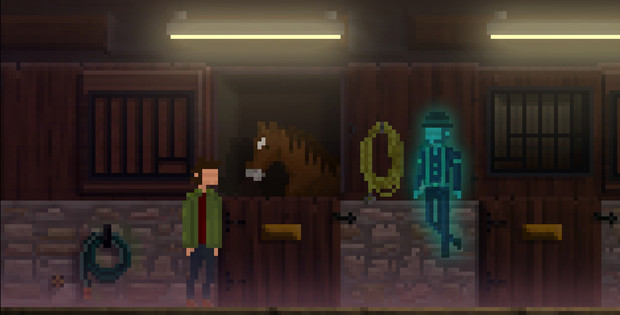
Two-parter here, which seem related but are actually very different questions: How is it that Oliver can see Englebert, and why is it that he can ONLY see Englebert?
It’s actually not explained in this game beyond a passing mention that every now and then a ghost and a breather become entangled with one another in an exclusive and shared bond, and later in the game it is hinted that perhaps some of the world’s most exceptional minds had an apparitional ace up their sleeve.
I can definitively say two things on the matter: First, I don’t like willy-nilly, shoot-from-the-hip lore, so there is a quite strict and established set of “game world rules” for ghosts – most of which are explained in Day 7; it’s very nerdy and I’m super excited about it. The other thing I can say is Oliver and Englebert have no other connection with each other. They’re not related in any way, etc. Simply because I thought it would be funny if a ghost showed up one day like, look, you’re the only living person that can hear me, you’re stuck with me and no, we have nothing in common.
I actually know living people like that! Okay, I’ve gotta ask about your hilarious choice of names. They sound like they belong to posh aristocrats and should come with Roman numerals after them, neither of which applies to Oliver or Englebert. (At least, not that we know of with Englebert.)
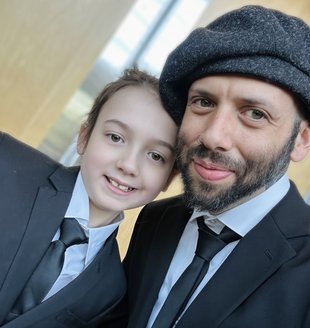
Oliver Cobblestone and Englebert Picklebender. Well, I put more thought into their names than the game’s name. Sometimes I look at all my branding and promo stuff like the game’s menu and I’m like, you know, you were supposed to circle back to this and then really pick a name for the game. I was all “Ghost Guy, P.I.” nah, too jokey. I like the word phantom; let’s use that. That, plus proper. And phantom plus proper I guess equals The Phantom Fellows because there I am capitalizing it – that’s how you know it stuck.
Anyway sorry, I went rogue. Oliver is simple: I wanted to name my son Strummer and was like, if his mom says no to that, I really like Oliver. And she said yes to Strummer. Oliver’s last name is Cobblestone, which I just thought sounded really cool; like I wanted that, for me. For the ghost I chose his name after the singer Engelbert Humperdinck, less because of his silky voice and more because what a delightfully silly name and his last name I wanted him to come from a long line of… you know, workers of a particular trade. Like Smith comes from a long line of blacksmiths. It just so happened that Michael Fassbender was on TV at the time and I was like bingo, a long line of Picklebenders!
I got the Engelbert Humperdinck reference! I used to hear it all the time as a kid and it never failed to get a laugh, because, c’mon, Humperdinck. So you made a great choice, even if you picked his other name. How much do we know of your Englebert’s former life as a “breather?” For that matter, how much does ENGLEBERT know of his own past?
Good question! Man, you’re really on today. So, I’ve been quite careful with Englebert’s history, very slowly dropping hints throughout the game. One less common but still running gag in the game is Englebert refuses to tell Oliver how he died and there’s also vague indications that… well, a lot of the ghosts seemed to have died tragically humorous deaths. As for his previous life, I can say this: Englebert was present during the construction of the Brooklyn Bridge and present (and in his prime) at the California gold rush. These facts, combined, gave Englebert knowledge of and experience with both early city life and life on the frontier, which is helpful for writing him. And yes, I picked the Brooklyn Bridge and the gold rush because I love Sierra’s game, Gold Rush!, where Jerrod begins his trek out west, from Brooklyn.
Oh, are you a Sierra fan? Huh! Learn something every day. But let’s put a pin in that for now. How deeply does the game explore the concept of the afterlife?
I would say the impact of the afterlife is handled largely through Englebert’s mentorship over Oliver. Englebert is in a position to have both remarkable levels of regret and the hindsight required to see what truly matters in life. As for the concept, what’s on the other side – ghosts in this world weren’t rejected, rather they haven’t been able to cross over yet, which means much like our actual world, I’m afraid nobody truly knows. Then again, at least in their world, ghosts serve as proof of the soul so I suppose they’re sleeping a bit better overall.
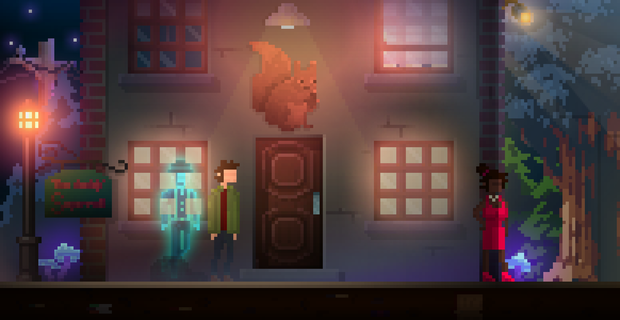
While offering all kinds of unique opportunities, I can imagine having your own personal ghost could get a little intrusive for the living, and terribly restrictive for the dead.
Yes, good points. It must be hard for Oliver when there’s no door you can close enough for privacy, and Englebert – especially during Day 5 in the game – shows he can grow quite annoyed with, if not tired of Oliver. Overall though, their relationship is playful. It is perhaps closest to two siblings most of the time, and then when it matters, when things get complicated or real, the relationship morphs more into father and son.
In terms of game design you’ve chosen a fairly retro approach, though thankfully modernized in key ways to be more accessible. I was kidding earlier, of course, as anyone who’s listened to your podcast knows you’re a big Sierra fan, but even with that influence, The Phantom Fellows feels like its own thing. What inspired your particular choices for how the game looks and plays?
My game’s art direction is a mix of Sierra’s AGI and SCI0 era designs, Thimbleweed Park’s lighting effects and The Darkside Detective’s innovative visual perspective, which is unique in that you never see the top of anything, only the sides, you only go left and right, and it has a kind of stage play-like 2.5D feel. For The Phantom Fellows I wanted the player to be able to have the agency to walk around and explore at free will and I also decided to really have fun with the lighting effects – I go pretty hard with them, which I feel works to help my game define its own style as well as complementing the ethereal vibes of the world.
For the interface I went with a Sierra point-and-click style because it’s a comedy. Being able to touch, look and talk to something or someone, as a ghost or breather, it’s just a ton of opportunity for laughs. And I really like the agency and exploration behind the choices. That said, I’m aware that this interface isn’t everyone’s favorite so I spent a lot of time designing an alternate, keyboard-centric style of playing where the player can use arrows or WASD to walk/float because you’re only moving left and right so it suits the arrows and then pressing 1 2 3 or LIT (Look Interact Talk) spares players the need to cycle through cursor modes with right-clicks. If they do cycle with right-clicks, I came up with a design where when there is no currently selected inventory item, there is instead a cursor of your inventory bag, so this way there is a consistent amount of clicks at all times, which I hope will make cycling with the mouse more precise and predictable for the player.
Oh man, I’ve uttered many a curse word due to over-cycling cursors! So I thank you for those extra touches. Besides “everything,” what’s been the biggest challenge you’ve encountered in getting the game to the finish line?
Past me. Like, easily. I’m always screwing me. And here’s where you’d think I’d be all, “just kidding it was actually _____” but no, that’s the right answer. I guess I could put a spin on it like, “well, as a solo developer….” But here, okay, here’s a mature-sounding response maybe: the biggest challenge I’ve encountered is my own lack of experience. Which is fancy for, past me.
That and getting achievements to work for the Mac port on GOG. Oy vey, Jack. Pain in the tuchus.
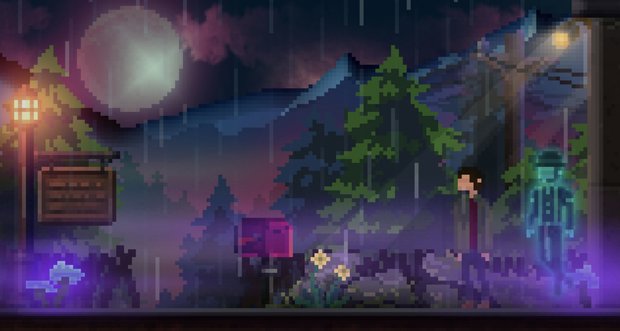
I totally get the “past me” answer. I’d like to give past me a big kick in the tuchus sometimes. (Did I use tuchus right?) But less metaphysically, can you identify any particular ways that past you made life difficult for later you?
If you’re asking for an example of how past me ran ahead and sabotaged a situation, I got one and maybe it can even spare someone else from doing the same: If you’re a solo developer who is also doing the soundtrack, do not do sound design before you score the game. I wasted weeks carefully crafting realistic sounds for inside a horse stable, a pub, a spooky forest… We’re talking intricate pans to the left, sweeping neighs and glass clinks to the right. I mean really, it was some THX-whatever surround sound kinda stuff. And then I scored the game and was like, oh. I have to cut all of this. Because it just competes for attention and ultimately does a disservice to the music. So, yeah, score the game, put it in the game and then see if there’s gaps to fill.
I’m not going to say “sound advice.” Just know that I’m thinking it. And speaking of redoing things, then there’s the whole totally-revamp-the-graphics situation. You substantially overhauled the art since you launched your original demo – and did a wonderful job; those are some beautiful chunky pixels now! How else has the game evolved since you first started out?
Thank you! That means a lot. I heard you say that on your podcast with Joshua (go on, give you a plug!) and it meant a lot then too because I wasn’t even in the room that time! But thank you, and yes, that overhaul came at a point where I had put in my several thousand hours in making pixel art and had an epiphany that if I designed my game like my real-life surroundings in beautiful Colorado, then suddenly I had a direction and a voice. It was at that time I also decided to stage the game in Elderberry, Colorado. Which is a fictional town named after a disappointing fruit.
As for how else the game evolved, well, I can’t even look at early versions of the game. It’s like seeing a picture of yourself in puberty, like GAH!
I’ve burned all those. It’s rare for games to have multiple solutions, but many of your puzzles offer alternate ways of solving them. How big a challenge was that, and why was it important to you?
To my surprise, it wasn’t as challenging as I expected. I designed all of my rooms first and filled them with what would realistically be in that kind of room. Pantry in a pub is gonna have bussing towels and glasses, tack room in a barn is gonna have rakes and hay. So, I found that approaching puzzle design after the room design made everything feel really natural. Puzzles seemed to present themselves to me rather than me trying to force one to fit somewhere.
Alternate solutions I approached methodically using my travel mechanic: starting in Day 3, players can go back to any previous locations they’ve been to. One of my main goals is to encourage and reward exploration, so the game makes it clear that you never have to leave the current location to solve a puzzle but if you have seen something around town before, that could be useful now – go get and try it out! So most of the alternate solutions are found around town and if you travel back somewhere and there isn’t anything to get, there will at minimum be new interactions with the characters from that location. The idea here is real-world puzzle logic. If you need a tool you obviously saw earlier in the game, just go get it.
We’re going to secretly pretend I asked this next question originally, when in fact it was completely different before you went and answered a much better question that I should have asked in the first place. So tell me, Paul, with no prior consideration given to the subject at all, what are some of the other neat elements and innovations in The Phantom Fellows that you’re particularly pleased with?
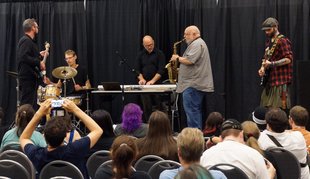
Well, Jack, I’m so glad you asked; there’s a few designs in the game I’m excited about. Day 5 is a murder mystery which features a cool notebook mechanic, there’s a quick-save feature in addition to a traditional saving function, everything in-game is a hotspot so you’ve got look-at and interact responses for everything (and I mean everything – the moon, the stars, the sky itself are all individual hotspots with unique dialog for both characters). There’s the world-building travel map we touched on already, and there’s an in-game dialog-based hint system that provides a really natural, flowy way for the player to get hints. Essentially, as Oliver you talk to Englebert, who already plays the role of mentor and he will provide guidance and hints without telling you more than you want to know. Think UHS (Universal Hint System) where you’re given ever-increasing details in the hints. This is handled through the dialog tree where you get two dialog choices: Tell Me More or Say No More, I’ve Got It From Here. If you ask for more, Englebert will give you a single hint. If you ask for more again, another stronger hint and so on, until the full solution is given. All the while, choosing Say No More allows you exit the dialog without hearing more.
Now that we’ve gone back and changed the past, the butterfly effect is that there is absolutely no way to smoothly segue into this next question, so let’s just roll with it: What other works have inspired you as a writer and artist?
I really enjoy philosophy and psychology; there are hints of Carl Jung in some of Englebert’s wisdom. On that front I also admire Dostoevsky, Frankl, Nietzsche and other names I had to look up how to spell just now. On the lighter side I’d argue Ace Ventura 2 is one of the greatest films of our time, dead ass serious/@me bro– wait, can I say ass? Have dead ass and Nietzsche ever been used in the same unironic sentence? Doesn’t matter. I’m not so sure Ace has a noticeable influence in my writing; I’m more a situational dialog kinda guy, but it definitely shaped who I am. Norm MacDonald is a hero, Indiana Jones (especially Last Crusade) had more subtle influence in this game than I thought until rewatching it recently… Blade Runner is a favorite of mine so its atmosphere was influence… Speaking of, musically, when I scored my game the aim was something like “the playfulness of John Carpenter mixed with the mood and ambience of Vangelis” so I’m a big fan of those guys. Love Slash, love weird Eastern electronic music by CloZee and David Starfire, the rapper Wax who makes a cameo in the game… and, okay, this is perhaps a bit self-indulgent, I’ll stop there!
After fudging our way through this interview (wait, can I say fudging?), people may not believe that I actually, genuinely just rewatched Ace Ventura 2 a couple days ago. How serendipitous! Although just one minor, ever-so-slight correction: it is in fact a horrible movie. Anyway, I’ll forgive you because you looked up the spelling of those intellectuals so I don’t have to. Is there room in the Phantom Fellows universe for more stories in future?
Well, funny you should ask, Jack – who I’ve been picturing swimming in a pool of gold since that opening question – allow me to leave you with an exclusive, y’all heard it here first, bit of news: I will be starting development of The Phantom Fellows 2 in November! Actually, I’ll do even better: TPF2 will be a little shorter and thus quicker to make- it’s going to be 3 Days (cases) and those 3 cases are already quite fleshed out. The plan is to carry the over-arching storyline from the first game all the way through the second game and to conclude it in the form of a trilogy.
Sweet! But dang, I shouldn’t have waited until the end to ask. Talk about burying the lede! But that’s great news, as the world needs more Oliver and Englebert (tee hee). Okay, I’ve taken up enough of your time, but I really appreciate you sharing these insights with our readers. It’s always a pleasure talking to you, and I wish you nothing but the best with The Phantom Fellows! Before we go, please remind people when and where they can find the game.
This was a ton of fun; thank you for having me! The Phantom Fellows releases Friday, September 27th 2024 and you can find it on GOG, Steam, FireFlower and itch.io.



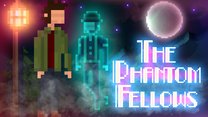
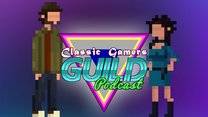
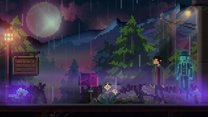
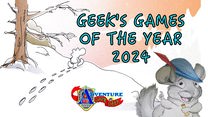
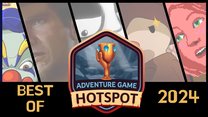
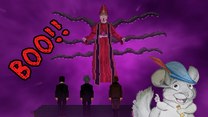
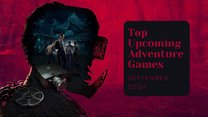
0 Comments
Want to join the discussion? Leave a comment as guest, sign in or register in our forums.
Leave a comment